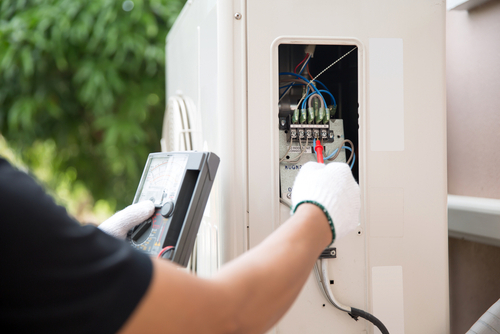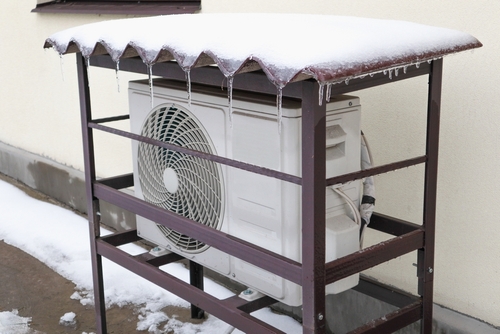December 7, 2023
Heat Pump vs HVAC System: Should You Switch?
With the diverse climate we experience here in Colorado, selecting the right system for heating and cooling is crucial for comfort and efficiency. In this post, we’ll explore how heat pumps work and compare them with traditional HVAC systems. As your local heating and cooling experts, we want to help you make an informed decision for your home.
How Does a Heat Pump Work?

A heat pump is an innovative system that provides both heating and cooling for your home. Unlike traditional heating systems that generate heat, heat pumps transfer heat from one place to another using electricity and evaporation. It’s similar to how a refrigerator or air conditioner works.
This unique mechanism makes heat pumps highly efficient, especially in moderate climates like in Colorado. They are versatile, energy-efficient, and a smart choice for those looking to embrace renewable energy solutions.
The Science Behind Heat Pumps
Basic Principle: The fundamental principle behind a heat pump is that it moves heat rather than generating it directly. This is accomplished through a cycle of evaporation and condensation, using a refrigerant substance that captures and releases heat as it circulates through the system.
Components of a Heat Pump: The main components of a heat pump include a compressor, a condenser, an expansion valve and an evaporator. These parts work together in a continuous cycle to transfer heat from one location to another.
Heating Mode: In the heating mode, the heat pump extracts heat from the outside air, even in cold weather, and transfers it indoors. The refrigerant, which circulates through the outdoor coils, absorbs the heat from the air. It then gets compressed, which increases its temperature before it is transferred to the inside. Once it’s moved indoors, it passes through the indoor coils which release the heat and warm your home.
Cooling Mode: Conversely, when cooling, the heat pump works like a regular air conditioner. It reverses the flow of the refrigerant to absorb heat from inside your home and then releases it outside. This process of extracting indoor heat and expelling it outdoors involves the refrigerant changing from a liquid to a gas and back again.
Efficiency Factor: What makes heat pumps remarkably efficient is their ability to transfer heat instead of generating it from a fuel source. This process requires significantly less energy, making heat pumps a more energy-efficient and cost-effective option compared to traditional HVAC systems.
3 Benefits of Installing a Heat Pump
1. Energy Efficiency
Heat pumps are champions of energy efficiency. They can reduce your energy consumption significantly and lead to lower energy bills. The U.S. Department of Energy notes that heat pumps can trim the amount of electricity used for heating by approximately 65% compared to electric resistance heating like furnaces and baseboard heaters.
2. Environmental Impact
By opting for a heat pump, you’re not just saving money, you’re also making an eco-friendly choice. Heat pumps have a smaller carbon footprint and align with Denver’s net zero guidelines for sustainable energy solutions.
3. Versatility and Comfort
Heat pumps provide consistent and comfortable temperatures throughout the year. Their ability to both heat and cool ensures that your home remains comfortable no matter the season.
Heat Pumps vs. Traditional HVAC Systems
You’ve learned what a heat pump is and how they work, but is a heat pump install right for your home? Here are some factors to consider:
Operational Differences
Traditional HVAC systems often require separate units for heating and cooling, whereas a heat pump does both. This dual functionality makes heat pumps a more streamlined and efficient choice. Many heat pumps feature additional features such as a two speed compressor which allows it to operate closer to capacity without switching off and on constantly. They also tend to be quieter with fewer drafts.
Cost Comparison
While heat pumps might have a higher initial cost than some HVAC systems, they offer significant savings in the long run. For homes using baseboard heating or an electric furnace, you’ll likely see significant savings in your electric bill. For those replacing a gas furnace or boiler, you’ll need to weigh the cost of natural gas vs electricity.
Maintenance Needs
Heat pumps require a bit more maintenance than a furnace but the tasks are simple and most homeowners shouldn’t have difficulty with them. These include changing the filter monthly, cleaning the coils annually and keeping your pump free of ice and snow in the winter and free of leaves and debris in the summer. When your unit requires new refrigerant, you’ll need to call in a licensed professional.

Suitability for Colorado Climate
Colorado’s climate varies greatly, but heat pumps are well-suited for the moderate temperatures we often experience. They are efficient in both the snowy winters and the warm summers, making them an excellent choice for year-round comfort.
For a more in depth explanation of the differences between a heat pump vs a furnace, Forbes has a good overview.
Get Expert Heat Pump Service and Advice
Whether you’re building a new home in Colorado or upgrading your existing heating and cooling system, considering a heat pump system is worthwhile. With their efficiency, versatility, and environmental benefits, heat pumps are an excellent investment for your home. For personalized advice or more information, reach out to your local Colorado home services experts at Applewood. If you already have a heat pump system and are looking for heat pump repair, our pros are ready to help!
Heat Pump FAQ
How long do heat pumps last?
With proper care and maintenance, a heat pump should last you around 15 years. Because they heat and cool all year round instead of seasonally, they don’t last as long as separate air conditioning units and furnaces.
How does a heat pump work in winter?
By using a refrigerant that is colder than the air temperature, a heat pump can still transfer heat energy despite wintery conditions. Heat pumps can work in cold conditions as low as -10 F.
What size heat pump do I need?
Choosing the best heat pump for your home requires a consultation with an expert to assess the size and layout of your home along with the existing ductwork.
Is a heat pump the same as a mini split?
A mini split is a type of ductless heat pump. It heats and cools your home via individual air handling units that are installed throughout your home and connected by refrigerant lines along its exterior. They allow for zoned heating and cooling and are a good solution for homes without existing ductwork.
What does a heat pump look like?
The compressor looks very similar to an air conditioner with coils and a large fan. Like an air conditioner, it is mounted outside of your home.


